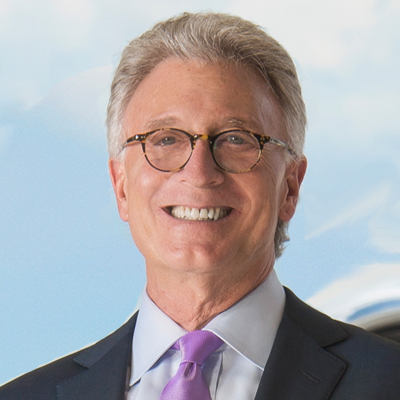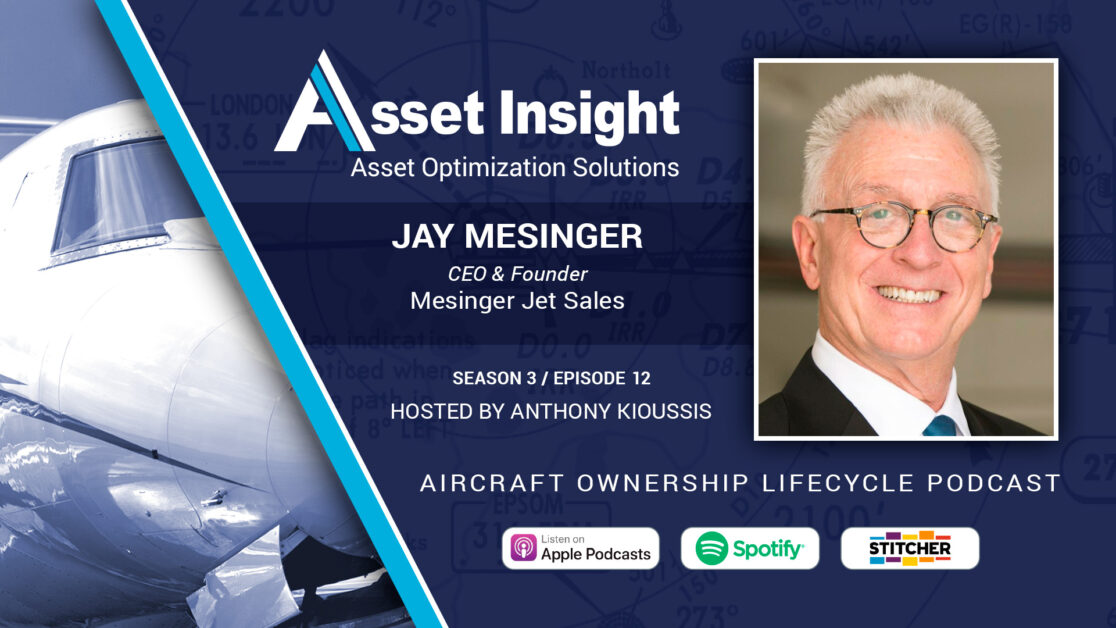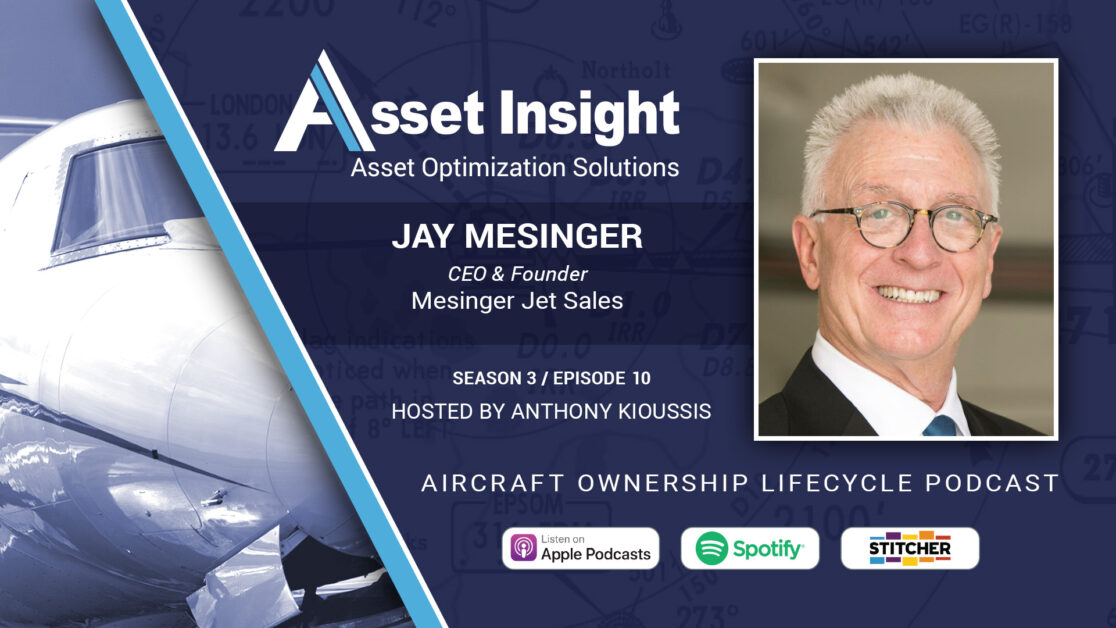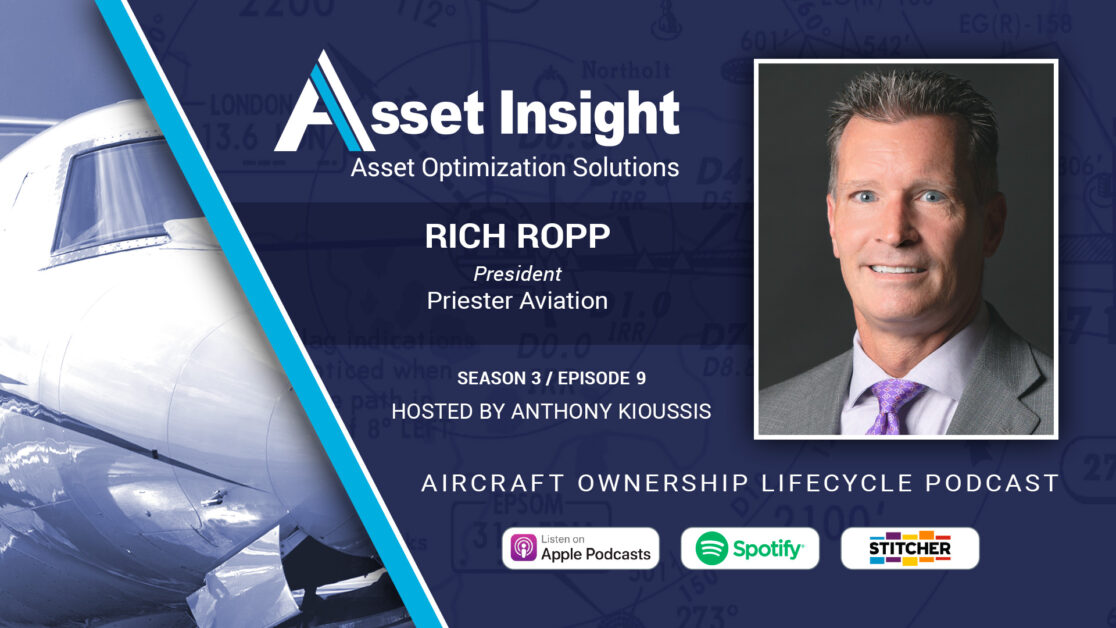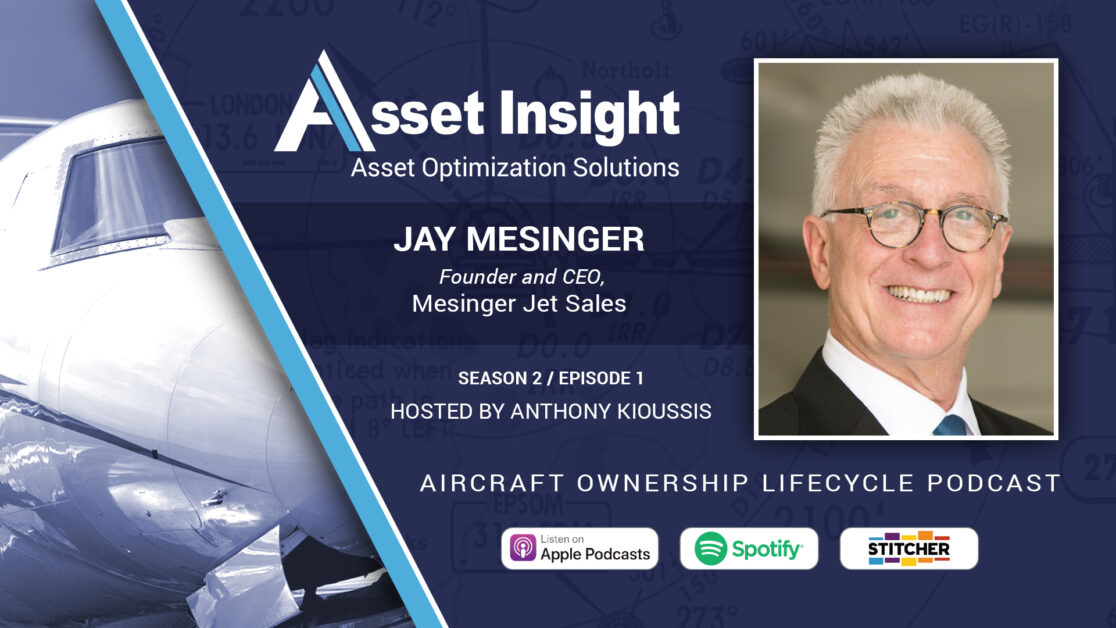
SEASON 2 • EPISODE 1
A Look Back at 2020 and Ahead at 2021
Jay Mesinger, CEO of Mesinger Jet Sales, provides his thoughts on how things evolved during 2020, amid a pandemic, a national election, and their combined effect on our nation’s economy. We also asked Jay to give us his thought about how 2021 might shape up. Areas covered include:
- Interest in an aircraft acquisition from first time buyers.
- Market trends based on fourth quarter sales.
- How did the US national election affect buyer views and actions during 2020.
- How is 2021 shaping up, and what might be expected this year.
- Possible tailwinds and headwinds that could help or hinder business aviation.
- How might interest in private flying change once the COVID vaccine has been made available.
- Lessons learned as a result of the pandemic.
About Jay Mesinger
Jay Mesinger is the CEO and Founder of Mesinger Jet Sales, an international aircraft brokerage firm, with over 47 years of experience in the aviation industry. Mesinger Jet Sales has modernized the formula for buying and selling aircraft providing their clients with the best market intelligence for aircraft sales pricing and correct acquisition expectations leading to successful transactions.
Jay is an industry leader and figurehead. He was a Member of the Board of the National Business Aviation Association (NBAA), and the Chairman of the Associate Member Advisory Council (AMAC). He was the first aircraft broker to serve on the NBAA board and served on the AMAC committee for 10 years ending in October, 2013. Jay has also been on the Customer Advisory Boards of Jet Aviation, Airbus North America and Duncan Aviation. Jay is and has been a member of Gulfstream’s “Key Player” team and Bombardier’s “Influencer” group since their respective inceptions. Jay is also a member of the European Business Aviation Association (EBAA) and the Colorado Aviation Business Association (CABA). And, Jay serves on the Board of Directors of The Morris Animal Foundation.
In addition, Jay regularly speaks at industry gatherings, writes the monthly Mesinger Pulse newsletter, and started the very first aviation brokerage website over 25 years ago.
Mesinger Jet Sales
Mesinger Jet Sales has modernized the formula for buying and selling aircraft providing our clients with the best market intelligence for aircraft sales pricing and correct acquisition expectations leading to successful transactions. Transparency, a hands-on process, forward-thinking intelligence and analysis, technical support throughout the transaction and an unwavering commitment to protecting our clients’ best interests are just some of the things that set us apart and all part of what leads to our success for our clients.
Tony Kioussis (00:34):
Welcome to another Asset Insight Podcast covering the aircraft ownership life cycle. I am Tony Kioussis, President of Asset Insight and your host. We’re speaking with Jay Mesinger, CEO of Messenger Jet Sales, and as someone who is becoming a regular contributor to our podcasts. He joins us today to discuss how things evolved during 2020, amid a pandemic, a national election, and their combined effect on our nation’s economy. We also asked Jay to give us his thoughts about 2021 and how this year might shape up. Welcome back, Jay, always great to have you on the program and get your market perspective.
Jay Mesinger (01:18):
A treat, Tony. Good to be back. Happy new year and happy new year to all of our listeners.
Tony Kioussis (01:23):
Yep, happy new year to one and all. When we spoke in October, you stated that starting in June and July of last year, interest in aircraft acquisition from first time buyers was beginning to translate into real activity, real buying, and a real desire not to ride on commercial airlines. Did that hold true through the end of the year?
Jay Mesinger (01:48):
Tony, as I said at the time, when the pandemic first started and some of the reality began to sink in to people about how long it might last and how contagious the virus was and how difficult it was to be in close proximity to another person, the phone calls started to come, as we talked in our last podcast from people who said, “I’m never going to ride on a commercial airliner again.” And to some extent, honestly, for myself and for many of my friends in this industry, it was idle conversation, almost took it as maybe there are people sitting at home like I am with too much time on their hands, so this is just a nice rant. As we got through May and into June, it became something less than idle conversation. It became a reality and a call to action. And we talked about that and it did hold true in an incredibly robust way through the end of the year.
Jay Mesinger (02:46):
And I’m optimistic except for maybe the desire to get something done by year end and get the bonus depreciation in play starting by having your plane in service by December 31st. I believe it’s going to still continue maybe without some of the panic of getting it done. But I think we’re going to still find people as they’re remaining aware of the amount of time this is going to be before everybody gets vaccinated, and I think it’s going to keep going. But yes, we actually had the best year we’ve ever had in what was 46 full years of doing business this last year, and remember it was a nine month year for all practical purposes.
Tony Kioussis (03:28):
Yeah, that’s true. It really was a curtailed year if you think about it. The sales figures for the aircraft we track showed a strong buying spree during the fourth quarter. Any particular trend or trends stand out in your view?
Jay Mesinger (03:44):
If I were going to say where that buying came from on a segmentation basis, I would say, and we might’ve even talked about this on the last podcast, that the corporate world had pretty much retreated and was not buying. The buying that corporations were completing were really the completion of a transition plan that was put in place some 24 to 12 months ago in ordering new planes from the factory. And then the corporate work that was being done, at least by our company, was the relinquishment of the airplanes as the new planes became available. So, from a segmentation standpoint, the buying segment was not from corporations, at least for pre-owned, and it was from first time buyers and high net worth individuals. And it was not necessarily, as you might think, along category lines, meaning we sold Hawker 800 XPs and we sold Gulf Stream 650s, and we sold Gulf Stream 550s, and we sold Challenger 300s.
Jay Mesinger (04:49):
So many of these first time buyers were coming in and buying on the basis of not necessarily where they could really use the airplane based on its mission, but buying based on what they wanted and how they wanted to get around. It’s funny, we talk a lot about millennials and their buying habits and are they really going to be buyers or will they be share users? But I think what I started to see, to tell you the truth, is even among these first time buyers, many of them would be in the millennial age group. And I think what they said is, “If I can afford it, I’m going to buy it.” And some of the thoughts that we thought they were going to have in terms of the Uber use for equipment like this went out the window as they began to not feel comfortable co-mingling or mingling with other users and they wanted their own piece of equipment.
Tony Kioussis (05:45):
Those are great comments, and you have a better perspective on the market than we do, because you’re dealing directly with the buyer or the seller of the aircraft. You and I both thought the election bring about some unwanted challenges, but from what we were able to witness, that didn’t appear to be the case. In fact, the election might have actually pushed some folks into closing transactions before the end of the year. Any thoughts on this?
Jay Mesinger (06:15):
I always look at election years as an opportunity for those people that are looking for a reason to sit on the fence to go back to the fence. I think people did get into a buying frenzy at the end of the year to capture what they knew for sure, at least in that period, was 100% bonus depreciation. And would that change? There are those that said that if the Republican stay in power, the tax laws will stay in effect, and so you could say some rushed to buy a plane thinking that if the Democrats got in power and they changed the tax laws, might that bonus depreciation go away? I heard less about persuasion at the end of the year and more about just taking advantage of at least what they knew was there, but not really having a fear that what was there was going to go away at least right away.
Jay Mesinger (07:06):
So I think that people really began to think that the problems that we were facing with the pandemic and with the economy were going to keep either party’s leadership from having time to deal with the tax change, at least during the first year. So what kind of disruptions might the election have caused? Probably less than other election periods. What kind of disruption is a result of people settling back in and beginning to figure out how to govern? We’ll have to see. But I see a stability because I continue to see, I mean, here we are now halfway through January and we actually are scheduled to have a busier January than we usually have. January’s are oftentimes where people retreat and think about their last year, do their planning, do their strategies for next year, and things get pretty quiet in January. I’m actually seeing people still out there still considering buying airplanes or talking about selling. We’ve picked up some terrific inventory in the first two weeks of January, and we picked up some great buying opportunities in the first two weeks of January.
Tony Kioussis (08:20):
I’m hearing the same comments from others about January and the first quarter in general. How do you see 2021 shaping up early on and through the year?
Jay Mesinger (08:31):
Well, I’m optimistic that 2021 will continue to be a very good year with people acting upon their desire either to not go on a commercial airliner and they don’t see a real in to it at least during the course of majority of 2021. So, that’s a buying reason. But I’m also just seeing people having a confidence in their space anyway with respect to the economy. Clearly, there’s some sadness going on in our economy that’s pandemic driven, but there are some people who are doing well right now and they are buying airplanes.
Tony Kioussis (09:10):
What are some of the tailwinds and headwinds you feel could help or hinder business aviation and aircraft sales in particular?
Jay Mesinger (09:20):
In terms of tailwinds, I think as I said, people are acting on their discomfort flying commercially, and that’s going to keep us with a nice tailwind of people buying. They’re also acting on the idea that those people that can afford airplanes are doing well and they’re going to continue to come in the market and spend their money in this way on that kind of equipment. And if you look around, you see other kinds of acquisitions, homes, second homes, third homes, and they’re using these airplanes to get from one home to the next. So those are the kind of tailwinds. In terms of headwinds, I still think that we’ve got some significant challenges that we’re in the middle of and ahead of us as we come to grips with and understand where we really go with getting to the other side of the COVID pandemic. And I do believe there’s light at the end of that tunnel. I just don’t know how long it’s going to take to get to the end of the tunnel and come back into the sunshine, and I think those could create some headwinds that could slow things down.
Jay Mesinger (10:23):
There’s another very important message that we shouldn’t ignore, and that is that though there is a significant amount of demand that we’re all enjoying it’s not going to change the fact that airplanes are pieces of equipment that will have residual loss rates that can be impacted more or less by external and internal industry factors. So prices of planes are not going up. In fact, I’m continuing to see them going down, not necessarily at an exaggerated pace, but certainly at a normal expected residual loss rate. So don’t be mistaken if you’re a seller to think that maybe you’ll wait to sell because things are going to get better price wise. I think the longer you would wait, the less you would get for your piece of equipment, even if it’s just what might be a traditional 2%, 3% a quarter.
Tony Kioussis (11:17):
I think waiting for prices to come back up is something of a fool’s errand. I have never seen prices come up except for one period where things just became disjointed in the industry. I counsel people all the time, “If you plan to sell, go ahead and sell, get it done and move on. It won’t help you holding onto the aircraft and sticking around with an asset that you cannot use.” I’m curious if you think interest in private flying will decrease once the COVID vaccine has been made available to the public.
Jay Mesinger (11:56):
Well, I think what will come back will be corporate transitions, more corporate work. So if we satiate the first time buyer segment, and that begins to level out, I would think that it will begin to level out because of some external factors like being more comfortable getting on a commercial airliner. And that sheer intensity and interest in getting back in the air, getting out ahead of your competition, getting in front of your client is going to get the corporate use back up again. So as one begins to level out I think that one will begin to come up, and that will keep our supply and demand and our busy-ness in the same place it is now in terms of transactional activity.
Tony Kioussis (12:43):
Greatly appreciate your thoughts and views, Jay. What changes have you had to make at Messenger Jet Sales to better serve your clients during this past year and also moving forward?
Jay Mesinger (12:56):
Well, I’m proud to say that we have the same group that we went into this with as we have now. I’m always proud to put our team in front of our clients. It’s a great group of people and we’ve had to make no changes there. We are doing something we never have done before, and that’s working remotely. We don’t get the benefit of seeing each other every day, but we make sure that we do talk every day, the whole team, and communicate well and we don’t lose anything there, nothing falls through the cracks. That’s a difference, and it’s taught me something really interesting. When we ever think of growth or adding people, we don’t necessarily need to have people who are in Boulder, Colorado. We’ve learned how to work that. We’ve learned some new habits.
Jay Mesinger (13:38):
We’ve also learned how to take more advantage, frankly, because of the limited and curtailed travel that we’re each allowed to do to take more advantage of some of the tremendous talent, especially on the technical side, that’s out there in the country. So now we’re really looking as we do site visits for airplanes and we do pre-purchase oversight and we do some of the things that we would deploy our Technical Director on, he’s staying back in Boulder and managing the work of now technical people that we’re hiring on a per job basis. So that’s been different and that’s really exposed us to some great talent in the marketplace that we’re using and deploying as we do the technical side of our work.
Tony Kioussis (14:23):
Thanks again, Jay. Any closing thoughts?
Jay Mesinger (14:28):
One other thought that I think is important and we shouldn’t overlook and that is that it’s the importance to our industry of the first time buyer. When a first time buyer comes into the marketplace, hangars get leased, pilots get hired, pilots get trained, maintenance companies get hired to do pre-purchases and modernization of the airplanes, insurance policies get sold. So there’s a real revitalization of our marketplace for all of us that are engaged in what we do when first time buyers come in. And so that’s been happening and I think that’s been great for our industry. I know that there’s some new habits being forged in terms of how will we do business when the pandemic is really under control and people can safely move about? Will things change? Will the frequency of our interaction with clients and our friends change? I hope that we go back to having NBAA Base and go back to having the kinds of trade shows and opportunities to get together and learn with our fellow professionals as well as entertain with our fellow professionals and just get to be together again.
Tony Kioussis (15:39):
This has been another Asset Insight Podcast covering the aircraft ownership life cycle. Please visit our ever growing podcasts library at assetinsightpodcast.com, and select from any number of topics discussed with business aviation industry experts. This is Tony Kioussis, and as always, thank you for listening.
Don’t forget to share this podcast!

